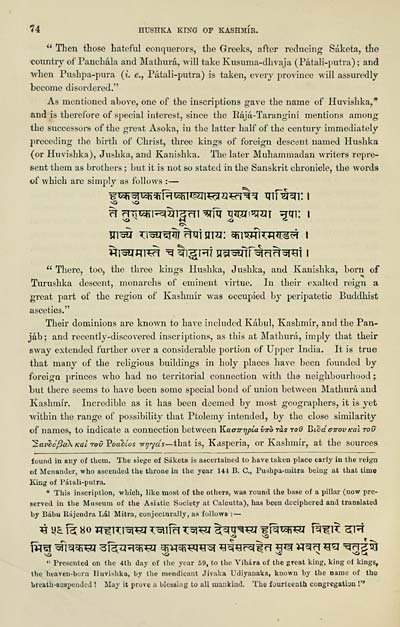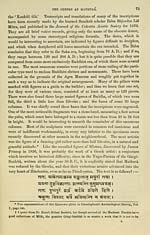Download files
Complete book:
Individual page:
Thumbnail gallery: Grid view | List view

1i HUSHKA KING OF KASHMIR.
^' Then those hateful conquerors, the Greeks, after reducing Saketa, the
country of Pauchala and Mathura, will take Kusuma-dhvaja (Patali-i)utra); and
^vhen Pushpa-pura (i. e., Patali-putra) is taken, every province will assuredly
become disordered."
As mentioned above, one of the inscriptions gave the name of Huvishka,*
^nd is therefore of special interest, since the Eaja-Tarangini mentions among
the successoi-s of the great Asoka, in the latter half of the century immediately
preceding the birth of Christ, three kings of foreign descent named Hushka
(or Huvishka), Jushka, and Kanishka. The later Muhammadan writers repre-
sent them as brothers ; but it is not so stated in the Sanskrit chronicle, the woi'ds
of which are simply as follows : —
m-^ Ti^?T^w mi RTi[: ^i^RTi^rs^ i
" There, too, the three kings Hushka, Jushka, and Kanishka, born of
Turushka descent, monarchs of eminent virtue. In their exalted reign a
great part of the region of Kashmir was occupied by peripatetic Buddhist
■ascetics."
Their dominions are known to have included Kabul, Kashmir, and the Pan-
jdb; and recently-discovered inscriptions, as this at Mathura, imply that their
sway extended further over a considerable portion of Upper India. It is true
that many of the religious buildings in holy places have been founded by
fbreigQ princes who had no territorial connection with the neighbourhood;
but there seems to have been some special bond of union between Mathura and
Kashmir. Incredible as it has been deemed by most geographers, it is yet
within the range of possibility that Ptolemy intended, by the close similarity
of names, to indicate a connection between Kao-n-'7/3tavTOTdsToi; Yjuld cttov Kal tov
'2avhoj3a\ Kal rod 'Poahlos -mjr-^ds—ihzi is, Kdsperia, or Kashmir, at the sources
found in auy of tbeiii. The siege of Saketa is aBcertaiiied to have taken place early in the reign
of Mcnander, who ascended the throne in the year 141 B. C, Pushpa-mitra being at that time
King of Patali-putra.
* This inscription, which, like most of the others, was round the base of a pillar (now pre-
served in the Museum of the Asiatic Society at Calcutta), has been deciphered and translated
by Babu Rajendra Lai Mitra, conjecturally, as follows : —
^ iia f^ 80 iqif TTi^^ TmxH T^^ 5^2^^ ^1%^^ f%WK ^1^
" Presented on the 4th day of the year 60, to the Vihara of the great king, king of kings,
the heaven-born Huvishka, by the mendicant Jivaka Udiyauaka, known by the name of the
breath-Buspeudcd ! May it prove a blessing to all ni.ankiud. The fourteenth congregation I"
^' Then those hateful conquerors, the Greeks, after reducing Saketa, the
country of Pauchala and Mathura, will take Kusuma-dhvaja (Patali-i)utra); and
^vhen Pushpa-pura (i. e., Patali-putra) is taken, every province will assuredly
become disordered."
As mentioned above, one of the inscriptions gave the name of Huvishka,*
^nd is therefore of special interest, since the Eaja-Tarangini mentions among
the successoi-s of the great Asoka, in the latter half of the century immediately
preceding the birth of Christ, three kings of foreign descent named Hushka
(or Huvishka), Jushka, and Kanishka. The later Muhammadan writers repre-
sent them as brothers ; but it is not so stated in the Sanskrit chronicle, the woi'ds
of which are simply as follows : —
m-^ Ti^?T^w mi RTi[: ^i^RTi^rs^ i
" There, too, the three kings Hushka, Jushka, and Kanishka, born of
Turushka descent, monarchs of eminent virtue. In their exalted reign a
great part of the region of Kashmir was occupied by peripatetic Buddhist
■ascetics."
Their dominions are known to have included Kabul, Kashmir, and the Pan-
jdb; and recently-discovered inscriptions, as this at Mathura, imply that their
sway extended further over a considerable portion of Upper India. It is true
that many of the religious buildings in holy places have been founded by
fbreigQ princes who had no territorial connection with the neighbourhood;
but there seems to have been some special bond of union between Mathura and
Kashmir. Incredible as it has been deemed by most geographers, it is yet
within the range of possibility that Ptolemy intended, by the close similarity
of names, to indicate a connection between Kao-n-'7/3tavTOTdsToi; Yjuld cttov Kal tov
'2avhoj3a\ Kal rod 'Poahlos -mjr-^ds—ihzi is, Kdsperia, or Kashmir, at the sources
found in auy of tbeiii. The siege of Saketa is aBcertaiiied to have taken place early in the reign
of Mcnander, who ascended the throne in the year 141 B. C, Pushpa-mitra being at that time
King of Patali-putra.
* This inscription, which, like most of the others, was round the base of a pillar (now pre-
served in the Museum of the Asiatic Society at Calcutta), has been deciphered and translated
by Babu Rajendra Lai Mitra, conjecturally, as follows : —
^ iia f^ 80 iqif TTi^^ TmxH T^^ 5^2^^ ^1%^^ f%WK ^1^
" Presented on the 4th day of the year 60, to the Vihara of the great king, king of kings,
the heaven-born Huvishka, by the mendicant Jivaka Udiyauaka, known by the name of the
breath-Buspeudcd ! May it prove a blessing to all ni.ankiud. The fourteenth congregation I"
Set display mode to: Large image | Transcription
Images and transcriptions on this page, including medium image downloads, may be used under the Creative Commons Attribution 4.0 International Licence unless otherwise stated. ![]()
| Early Gaelic Book Collections > J. F. Campbell Collection > Mathurá > (94) |
|---|
| Permanent URL | https://digital.nls.uk/80510538 |
|---|
| Description | Volumes from a collection of 610 books rich in Highland folklore, Ossianic literature and other Celtic subjects. Many of the books annotated by John Francis Campbell of Islay, who assembled the collection. |
|---|
| Description | Selected items from five 'Special and Named Printed Collections'. Includes books in Gaelic and other Celtic languages, works about the Gaels, their languages, literature, culture and history. |
|---|

